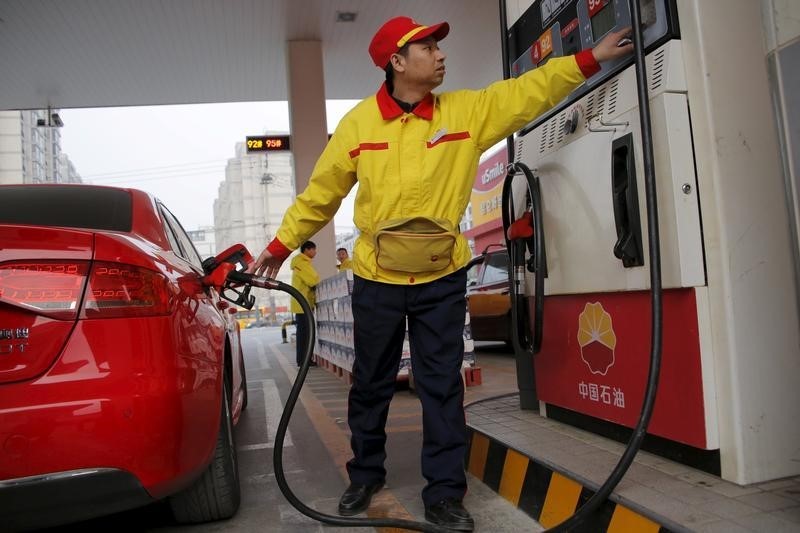Investing
Oil prices edge lower; set for positive week on Chinese optimism

© Reuters.
Investing.com — Oil prices edged lower Friday, with traders taking profit from the hefty gains seen this week, largely on optimism that the vital Chinese economy is showing signs of improvement.
By 09:05 ET (13.05 GMT), the futures traded 0.2% lower at $89.98 a barrel, while the contract dropped 0.2% to $93.49.
Chinese optimism boosts market
The crude market received a boost earlier Friday following the release of stronger-than-expected and data from China, boosting optimism over an economic recovery in the largest crude importer in the world.
This added to the positive sentiment generated by the decision of the People’s Bank of China on Thursday to cut the for local banks by 25 basis points – its second such cut this year. The move is expected to release more liquidity into the Chinese economy and potentially shore up economic growth.
China’s oil refinery throughput in August also surged to a record high, data on Friday showed, as solid summer travel demand and a rush to take advantage of strong export margins led processors to keep run rates elevated.
The refining figures come as markets are attempting to gauge if output reductions by key producers Saudi Arabia and Russia will keep supplies tight this year.
Oil set for over 3% weekly gain
Both crude benchmarks were set to gain more than 3% each this week, their third straight week of gains.
Crude prices have been on a tear since early June, after Saudi Arabia and Russia said they will cut supply by a combined 1.3 million barrels per day. The two recently extended their supply cuts until the end of the year, providing another leg up to crude prices.
The prospect of tighter markets, in the wake of the supply cuts, has been the biggest boost to oil prices this year, helping them jump more than 30% since June.
ECB hints at final rate hike
This positivity has helped the market to largely look past released this week, which showed that fuel demand in the country may be slowing as the travel-heavy summer season winds down, as well as slowing economic growth in Europe, a major consuming region.
The raised its key deposit rate to a record high of 4% on Thursday, but also signalled that its 10th straight hike was likely to be its last as it downgraded its growth forecasts.
Additionally, the higher oil prices will likely lead to increased political pressure, particularly in the U.S., where the Biden administration has already reduced the country’s Strategic Petroleum Reserve to 40-year lows in an attempt to cushion consumers from high prices.
“It appears as though the U.S. Department of Energy has already been in touch with domestic oil producers and refiners with regard to inventories and the supply outlook,” said analysts at ING, in a note. “We are likely to hear only more noise around this matter, particularly after a strong CPI print.”
Read the full article here

-

 Side Hustles3 days ago
Side Hustles3 days agoWhy the Best CEOs Think Like Anthropologists
-

 Side Hustles6 days ago
Side Hustles6 days agoLA Rental Prices Skyrocketing Despite Price Gouging Laws
-

 Make Money4 days ago
Make Money4 days agoEarn More in 2025: Top 10 High-Yield Savings Accounts Revealed
-

 Side Hustles6 days ago
Side Hustles6 days agoHow to Craft Marketing Campaigns That Reach Multiple Generations
-

 Side Hustles4 days ago
Side Hustles4 days agoWhat to Do If TikTok is Banned — How to Protect Your Brand
-

 Side Hustles5 days ago
Side Hustles5 days agoMeta Is Laying Off 5% of Its Workforce: Read the Memo
-

 Passive Income4 days ago
Passive Income4 days agoHow Pets Can Promote Better Health and Well-Being in the Workplace
-

 Make Money5 days ago
Make Money5 days agoBuild Your Future: 5 Simple Steps to Financial Stability


















